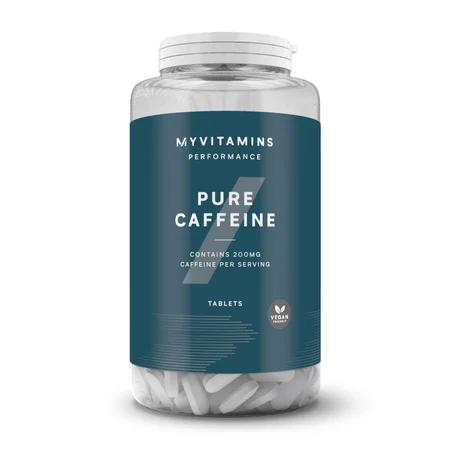Introduction To Caffeine Supplements: Usage & More

Caffeine supplements are often associated with athletes and late-night studying. However, there are a variety of lesser known, but surprisingly useful, benefits to supplementing with caffeine. Read on to discover how to safely implement caffeine supplements into your routine, for enhanced physical and mental performance.
What Are Caffeine Supplements?
Caffeine is a stimulant that acts on the central nervous system, or the brain, spinal cord and nerves, to make an individual feel more alert and focused. It mimics adenosine in structure, and binds to adenosine receptors to reduce the amount of this neurotransmitter reaching the brain. This delays a person’s need for sleep (1).
Naturally, caffeine can be found in a variety of foods and beverages, such as tea and coffee. Within a supplement, caffeine can come in natural or synthetic form, and often contains between 100-200mg of caffeine. This is a higher amount than your average cup of coffee, and more than four times the amount in a cup of tea.
The Myvitamins Caffeine Gummies and Pure Caffeine Tablets contain 160mg and 200mg of caffeine per serving, respectively. While the Pure Caffeine Tablets contain a strong dose of caffeine alone, the Caffeine Gummies are also fortified with over 80% of your daily vitamin B5 and B12 needs. These vitamins are known to support energy levels and reduce feelings of tiredness and fatigue, elevating the effects of this supplement even further (2).
Benefits
Caffeine supplements are known for their concentration and focus-inducing properties. However, there are a variety of other advantageous benefits to caffeine supplements, including:
- Improved athletic performance
- Increased focus and concentration
- Weight management
- Relief for headaches and migraines
Improved athletic performance
Caffeine is a go-to supplement amongst athletes and those looking to improve performance during exercise.
Research suggests that caffeine supplementation may improve focus during exercise. Furthermore, the use of caffeine tablets or caffeine gummies can increase endurance and reduce feelings of tiredness and fatigue. This enables an individual to train for longer periods of time. Other research has associated caffeine supplementation with increased power in muscle contractions, increased speed, and enhanced muscle recovery following exercise (3).
These effects are suggested to arise from the elevated levels of adrenaline in the body caused by caffeine intake.
Coffee and caffeine tablets are often favourites amongst students and those working long hours. This is due to the increased ability to focus and concentrate experienced by those supplementing with caffeine. With the added bonus of reducing tiredness and fatigue, caffeine supplements can help individuals feel more alert and perform better at work.
Research into this phenomenon found that a 200mg caffeine supplement also improved memory during a learning task, in comparison to those taking a placebo (4).
The effects on focus and mental performance are due to the increased release of neurotransmitters such as dopamine and adrenaline following caffeine ingestion.
Weight management
Caffeine has also been found to help promote weight loss, by stimulating the nervous system to mobilise fat from the fat tissues. The elevated adrenaline levels present in the body direct the fat tissues to break down fat and release it into the bloodstream. During a calorie deficit or negative energy balance, these fatty deposits can then be utilised as energy.
Furthermore, research suggests that caffeine can increase your metabolic rate. This means it can increase how many calories your body burns, therefore promoting weight loss (5).
Relief for Headaches and Migraines
Caffeine can reduce tiredness and fatigue, which are both often associated with increased risk of headaches and migraines. However, caffeine supplementation has also been suggested to change an individuals perception of pain. Therefore, caffeine is a key ingredient in many effective pain relief and headache and migraine treatments.
One study demonstrating this effect used caffeine in conjunction with either paracetamol or aspirin. Results found that the addition of caffeine reduced the amount of analgesic needed for pain relief by up to 40% (6).
Side Effects
As with all supplementation, caffeine supplements do carry a risk of side effects, including:
- Headaches
- Shaking
- Sweating
- Diarrhoea
- Increased heart rate
- Irritability
- Difficulty sleeping
- Dizziness
How Much Caffeine Supplements Can I Take?
The amount of caffeine in a supplement varies by brand, though many contain between 100-200mg of caffeine per dose. Generally, it is not recommended to exceed 400mg of caffeine daily for healthy adults. 200mg is recommended as the safe upper limit for individuals who are pregnant, for children and adolescents, and for people with a chronic health condition.
Consuming too much caffeine can increase risk of uncomfortable and sometimes dangerous side effects. If you are consuming other caffeine-containing products, such as tea, coffee or energy drinks, it is recommended to hold off on caffeine supplements.
Are Caffeine Tablets Safe?
Consuming up to 400mg of caffeine per day is safe for healthy adults. However, as with many stimulants, there is a risk of becoming dependent on caffeine if it is not ingested in moderation or according to safety guidelines. Withdrawal can then become difficult, as symptoms such as dizziness, fatigue and anxiety may be present.
In comparison to pure caffeine powder or liquid, caffeine tablets provide a more accurate and reliable method of supplementation. Caffeine powder is a highly potent substance that can be very dangerous in use, as it is more difficult to measure precise amounts. With overdose, this can lead to toxic effects, and may be life-threatening.
To stay safe, monitor your caffeine intake from natural sources and adhere to the safety guidelines on your supplement packaging. Use a tablet or gummy rather than pure powder form, and avoid over-the-counter medications containing caffeine, unless cleared by your doctor. Finally, be observant of side effects and seek medical attention if they become distressing.
How To Take Caffeine Supplements
It is important to keep yourself safe while aiming to obtain maximum benefit from your caffeine supplement. To do this, and reduce the risk of side effects, here is how we recommend taking your supplement:
- Ascertain how much caffeine you may have already consumed throughout the day.
- Aim to ingest no more than 400mg of caffeine each day, considering your current intake from natural sources such as tea and coffee.
- With the Myvitamins Pure Caffeine Tablets, consume no more than two tablets per 24 hours. Do not take more than one 200mg tablet per hour. These convenient tablets are an easy way to boost your energy and focus without the need for several cups of coffee.
- For the Myvitamins Caffeine Gummies, one 160mg dose requires consuming four gummies. These tasty, vegan-friendly blue raspberry flavoured gummies also contain B-vitamins for an extra energy boost.
- Have a glass of water after your supplement to help increase solubility and keep you hydrated.
Talk To Your Doctor
Myvitamins are not making any medical claims within this article. If you are interested in supplementing with caffeine, speak to your GP to discuss the benefits and safety in your unique case.
Take Home Message
Caffeine supplements stimulate the central nervous system to provide a wide array of benefits. This can include improving athletic performance, increased focus and concentration, providing support to maintain a healthy weight, and relief for headaches and migraines.
Caffeine supplements are safe to consume when done so according to guidelines, and within the healthy range of daily caffeine intake. However, overdose may lead to unpleasant side effects.
If you are looking to boost your performance at work or during exercise, consider implementing a caffeine supplement into your routine.
FAQs
What do caffeine supplements do?
Caffeine supplements stimulate the central nervous system to provide a range of effects such as improving focus, memory, athletic performance, and reducing feelings of fatigue.
Is it OK to take caffeine pills every day?
Caffeine pills are safe to take daily, so long as your intake does not exceed 400mg per day. It is also important to take breaks from caffeine supplementation to reduce your risk of becoming dependent.
What are the benefits of caffeine tablets?
There are a variety of benefits to taking caffeine tablets. The main benefits are improved athletic performance, improved focus and concentration, reduced headaches and migraines, and support with weight management.
What are some side effects of caffeine tablets?
Caffeine tablets can lead to side effects such as shaking, dizziness, headaches, anxiety, sweating, diarrhoea, increased heart rate, irritability and sleep disturbances. More severe side effects may include an irregular heart rhythm or vomiting.
How long will a caffeine pill keep you awake?
It can take up to an hour for a caffeine supplement to take effect. The effects may then last between 4-6 hours.










